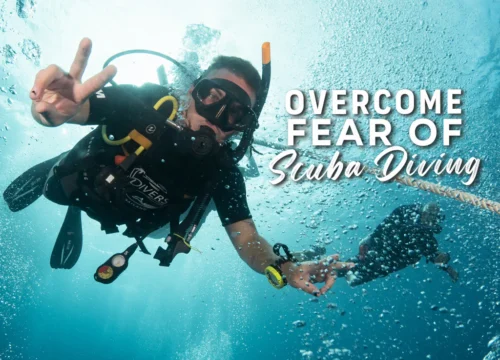Deconstructing the Fear of Sharks: Replacing Baseless Dread with Educated Respect
Welcome to the first in-depth article in Amadive’s series on Overcoming Scuba Diving Fears. As instructors, we notice a question that always appears in the eyes of our new students: “Are there sharks here?” It’s a completely valid question, nurtured by decades of Hollywood films and sensationalized stories.
Our mission in this article isn’t to tell you “don’t be afraid.” Our mission is to arm you with knowledge and facts so you can accurately assess the risk for yourself. We will dismantle the fear built from myth and replace it with a healthy respect for one of the ocean’s most majestic and vital creatures.

Understanding the Source of the Fear: The “Jaws Effect” and Primal Psychology
The human fear of sharks is real, but it is largely not based on real-world experience.
- Media Influence: The 1975 film “Jaws” created a powerful but false image of sharks as intentional, man-eating machines. This image has been deeply ingrained in popular culture.
- Evolutionary Psychology: Humans have an instinctive fear of large, sharp-toothed predators. It’s a survival mechanism. However, underwater, we are not on their menu.
The Scientific and Statistical Reality.
When confronting fear, data is your best friend.
- Extremely Low Probability: According to reputable organizations like the International Shark Attack File (ISAF), the odds of being attacked by a shark are about 1 in 4.3 million. You have a much higher chance of being struck by lightning (1 in 80,000) or injured in an accident with fireworks (1 in 340,000). Attacks on scuba divers are even rarer.
- Why Aren’t Scuba Divers a Target?
- Mistaken Identity is Unlikely: Most of the (very rare) attacks occur on surfers or swimmers at the surface, where their silhouette from below can resemble a seal—the natural prey of great white sharks. A diver underwater, with a bulky shape and exhaling bubbles, looks like nothing in their natural food chain.
- Divers Are Noisy Guests: The constant sound of bubbles from our regulators is an unnatural and often off-putting sound that causes most shy shark species to keep their distance.
Real-World Experience from Amadive Instructors

From thousands of dives in Vietnamese waters, we can share our direct experience:
- The Sharks You Might See: In areas like Nha Trang or Phu Quoc, the most common shark is the Whitetip Reef Shark. They are shy, often resting on sandy bottoms during the day, and will almost always swim away when divers approach. Seeing one is a lucky treat!
- Typical Behavior: 99.9% of underwater encounters are peaceful. Sharks might be curious; they may swim by in the distance to observe, but they are not confrontational. They are calculating predators that do not waste energy on something they don’t recognize as food.
The Golden Rules for a Safe Interaction
While the risk is low, respect and proper behavior are key.
- Stay Calm, Don’t Panic: The most important action is to control your breathing and remain calm. Sudden, frantic movements can be mistaken for a distressed animal, which can attract curiosity.
- Always Keep Your Eyes on the Shark: Sharks are ambush predators. They are less likely to approach if they know they are being watched.
- Maintain a Vertical Position: If you feel uneasy, group together with your buddies and maintain a vertical (upright) position in the water. This makes you appear larger and less fish-like.
- Never Corner or Feed: Always give them an escape route and never attempt to touch or feed them.
Frequently Asked Questions (FAQ)
- If I bleed underwater, will a shark smell it from miles away?
- This is a myth. While their sense of smell is acute, they cannot detect a minuscule amount of blood from great distances in the vast ocean. Furthermore, they are attracted to the blood of fish and marine mammals, not human blood.
- What should I do if I feel genuinely scared during an encounter?
- Calmly signal to your dive guide. They are trained to handle the situation and will lead the group safely away from the area.
Conclusion: From Fear to Awe
The best way to overcome a fear of sharks isn’t to try and ignore it, but to confront it with knowledge. When you understand that they are not mindless monsters but ancient creatures with a vital role in the marine ecosystem, fear gives way to respect and awe. Seeing a shark in its natural environment is one of the most rewarding and memorable experiences a diver can have.
Important Disclaimer: Your safety is ensured by diving with experienced professionals. Always choose a reputable dive center and listen carefully to all safety briefings before every dive.
